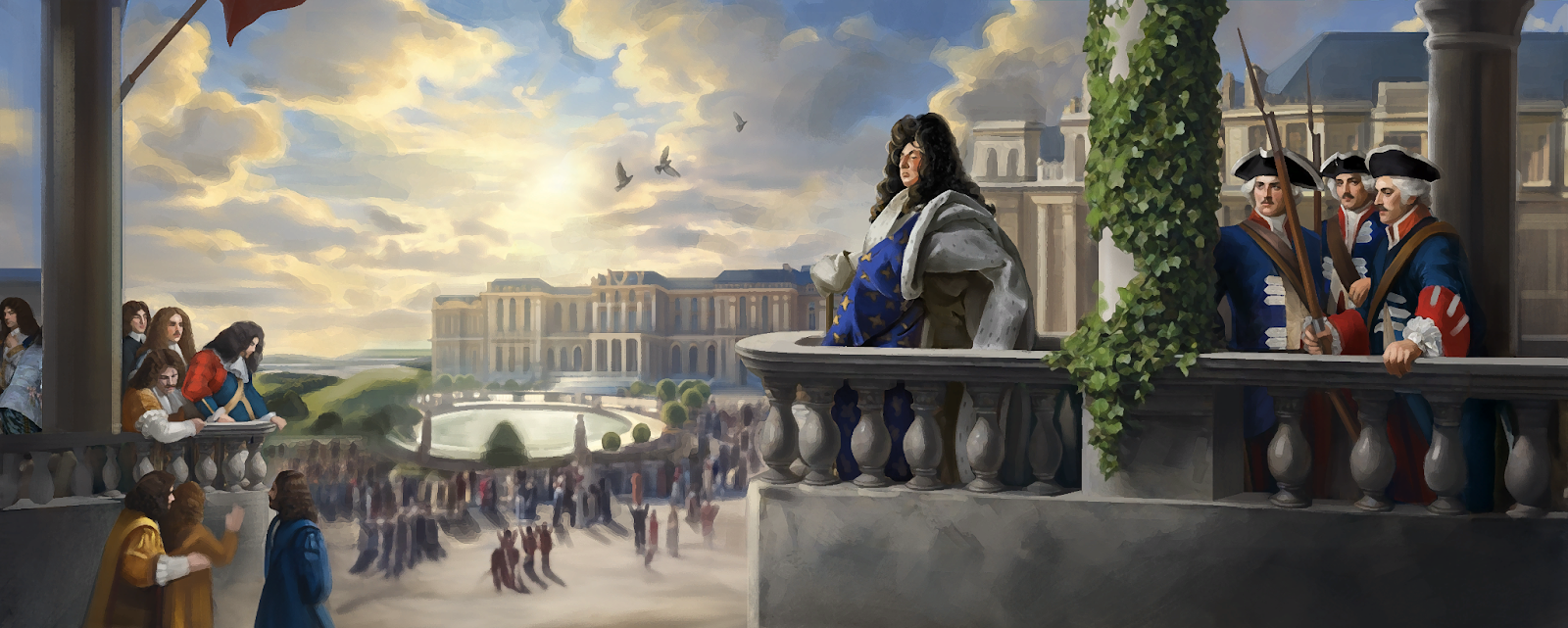Welcome to the fifth Tinto Talks, where we talk about the design for our upcoming top secret game with the codename ‘Project Caesar.’

The state is me! Oh, you meant E-state, sorry.. not me ..
Today we will go into detail about one of the core systems in the game, and talk about how estates work.
First of all, there are four estates in Project Caesar, which mostly map 1 to 1 with a social class: Nobility, Clergy, Burghers and the Commoners. There is also the Crown, which represents the state itself.
Each estate gains power based on the amount of population belonging to the estate, which is also modifiable by local attributes of where the population is, where some nobles may have very high power in a certain area, or whether a specific city has entrenched burgher rights there.

This is the estates part of the government view, where you can see their power, current satisfaction, the equilibrium its trending toward, and what privileges it currently has.
Every 1,000 nobles gives +50 estate power to their estate, while 1,000 peasants merely give +0.05 estate power as default. Then these are modified locally in every location, as mentioned above, and then in the entire country by laws, reforms and most notably the privileges that you have given the estates.
The total power of all the 4 estates and the crown then together all add up to 100%, which is the effective power they have.
Depending on your crown power, you either get a scaling penalty or scaling bonus, on aspects like the cost of revoking estate privileges, the cost of changing policies in laws, the efficiency of the cabinet, the expected costs of the court, and other things. If your crown power is weak, you need to have the estates really satisfied, or you will not get much out of any parliament you try to call.
Each of the four estates has a current satisfaction and an equilibrium it will move towards. Some estates, and some countries, will have the estate satisfaction moving quicker to the equilibrium than others. Each estate has 2 factors per type of estate in which their satisfaction impacts the entire country, where satisfaction above 50% gives a scaling bonus, and below, a scaling penalty.
If the satisfaction is below 25%, this estate will not provide any levies. Most importantly, the estate satisfaction also impacts the satisfaction of the pops that belong to that estate, possibly creating rebel factions or even civil wars.
So what impacts the satisfaction equilibrium of an estate? The privileges they get, the current stability, some reforms may impact them, some laws may, how you tax them, and much more. Some examples include clergy being happier with higher religious unity or burghers liking having more market centers in your country.
# estate privileges
Estate Privileges then? You may feel forced to grant privileges to estates to be able to tax them more, and you may be forced to grant privileges to get their support in parliament. All privileges impact the power of their estate, and many also increase their satisfaction equilibrium. They all have some impact on gameplay fitting the privilege, and often they also impact a societal value of their country.

WiP ui, temporary graphics and no icons etc.
There are many different privileges, and many unique ones depending on where and what type of country you play.
We mentioned taxes before, and while this is not the development diary where we go into details about the economic system, it is important to mention that the estates of a country have wealth that is increased by the amount of money that you have not taken from them in taxes. Rich estates will use their wealth on many things, primarily to invest into things that benefit them, but will often also build things that also benefit the country.
Next week we will talk about a few new concepts that are rather new to this game that have not been present in previous games, as we will talk about proximity, control and maritime presence, all concepts that need to be talked about in detail, before we go into the economy system.
The state is me! Oh, you meant E-state, sorry.. not me ..
Today we will go into detail about one of the core systems in the game, and talk about how estates work.
First of all, there are four estates in Project Caesar, which mostly map 1 to 1 with a social class: Nobility, Clergy, Burghers and the Commoners. There is also the Crown, which represents the state itself.
Each estate gains power based on the amount of population belonging to the estate, which is also modifiable by local attributes of where the population is, where some nobles may have very high power in a certain area, or whether a specific city has entrenched burgher rights there.
This is the estates part of the government view, where you can see their power, current satisfaction, the equilibrium its trending toward, and what privileges it currently has.
Every 1,000 nobles gives +50 estate power to their estate, while 1,000 peasants merely give +0.05 estate power as default. Then these are modified locally in every location, as mentioned above, and then in the entire country by laws, reforms and most notably the privileges that you have given the estates.
The total power of all the 4 estates and the crown then together all add up to 100%, which is the effective power they have.
Depending on your crown power, you either get a scaling penalty or scaling bonus, on aspects like the cost of revoking estate privileges, the cost of changing policies in laws, the efficiency of the cabinet, the expected costs of the court, and other things. If your crown power is weak, you need to have the estates really satisfied, or you will not get much out of any parliament you try to call.
Each of the four estates has a current satisfaction and an equilibrium it will move towards. Some estates, and some countries, will have the estate satisfaction moving quicker to the equilibrium than others. Each estate has 2 factors per type of estate in which their satisfaction impacts the entire country, where satisfaction above 50% gives a scaling bonus, and below, a scaling penalty.
If the satisfaction is below 25%, this estate will not provide any levies. Most importantly, the estate satisfaction also impacts the satisfaction of the pops that belong to that estate, possibly creating rebel factions or even civil wars.
- Nobility impacts your prestige gain and your counterespionage.
- Clergy impacts your research speed and your diplomatic reputation.
- Burghers impact your merchant power and the production efficiency.
- Commoner impacts your food production and your stability costs.
So what impacts the satisfaction equilibrium of an estate? The privileges they get, the current stability, some reforms may impact them, some laws may, how you tax them, and much more. Some examples include clergy being happier with higher religious unity or burghers liking having more market centers in your country.
# estate privileges
Estate Privileges then? You may feel forced to grant privileges to estates to be able to tax them more, and you may be forced to grant privileges to get their support in parliament. All privileges impact the power of their estate, and many also increase their satisfaction equilibrium. They all have some impact on gameplay fitting the privilege, and often they also impact a societal value of their country.
WiP ui, temporary graphics and no icons etc.
There are many different privileges, and many unique ones depending on where and what type of country you play.
We mentioned taxes before, and while this is not the development diary where we go into details about the economic system, it is important to mention that the estates of a country have wealth that is increased by the amount of money that you have not taken from them in taxes. Rich estates will use their wealth on many things, primarily to invest into things that benefit them, but will often also build things that also benefit the country.
Next week we will talk about a few new concepts that are rather new to this game that have not been present in previous games, as we will talk about proximity, control and maritime presence, all concepts that need to be talked about in detail, before we go into the economy system.



